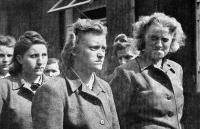Women in Holocaust -Izraeli new exhibition

The life of the Holocaust women- prisoners: one trades a day's food ration for a needle to make a bra, another makes a comb and hair rollers from scrap wire and the third embroiders the names of her fellow inmates on a Nazi flag.
The women, inmates of German concentration camps, are featured in a new exhibit that opened Friday at Israel's Yad Vashem Holocaust museum on how women coped in the face of Nazi brutality.
"Instead of asking them what the Nazis did to you, I asked what you did in the situation," said Yehudit Inbar, the exhibit's curator. "They were almost shocked because no one asked them those questions before."
Featuring photographs, written accounts and articles preserved from the war, the exhibit, "Spots of Light: To Be A Woman in the Holocaust," contains dozens of examples of women's attempts to preserve their humanity.
On display is a bra that Lina Beresin, a seamstress, fashioned from lining she removed from men's jackets. She used thread from her blanket, a shard of glass instead of scissors, and a sewing needle she received from another prisoner in exchange for a day's worth of food.
"I wore the bra for almost seven months until the liberation" in January 1945, Beresin's account says.
Also on display is a red section of a Nazi flag on which Yehudit Aufrichtig embroidered the names of fellow prisoners, and a recipe book she kept during her internment at a concentration camp. Women inmates often talked about food and recipes to sustain themselves, said Lenore Weitzman, a George Mason University sociology professor who has studied women in the Holocaust.
Margot Fink collected scrap wire from the Reichenbach concentration camp to make a comb and hair rollers. "If they caught me, I would have been severely punished," she wrote.
Fink, Beresin and Aufrichtig all eventually survived the Holocaust.
Holocaust survivor Kaja Finkler, born in Warsaw in 1935, attended Friday's opening to see the account of her mother, Golda. The daughter of a rabbi, Golda, who died in 1991, wrote Jewish prayers on the back of paper scraps at the munitions factory where she labored during the war.
An early proponent of women's rights, the mother excised part of one prayer saying, "Blessed be you who has not made me a woman," said Finkler, now an anthropology professor at the University of North Carolina.
Subscribe to Pravda.Ru Telegram channel, Facebook, RSS!


